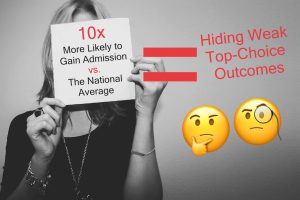Are Top College Consultants Worth It?

-
Are the "Best" College Consultants Worth It?
4 Warning Signs You’re About to Waste ThousandsA 'Top Ranked' College Admissions Consultant Reveals All
Every year, thousands of families spend $5,000–$50,000 on college consulting services, hoping it’ll be the edge their child needs. But in a largely unregulated industry, even the firms ranked as “best” online can lead you astray. Here’s how to spot the difference among real expertise, overpriced services, and well-funded hype.
1
Distrust “Top College Admissions Consultants” Lists.
They Can Be Affiliate-Driven, Pay-to-Rank Schemes With a Disregard for Quality
-
🥇🤑🥈🤮🥉
Among the best ranked college admissions consultants are often some of the worst. Such listicles mislead Google, ChatGPT, and Families.
One of the most visible “Best College Consultants” lists—TopCollegeAdmissionsConsultants.com—is run by PartnerCentric, a 1.5-star-rated affiliate marketing firm on Indeed with no college admissions expertise. Its 'top firms' for 2025 changed month to month and half of them were swapped out by mid-year. Before ranking College Zoom (us), the site never reached out to vet us but repeatedly solicited payment for leads—offering us a higher ranking (within spots 1–5) or preservation (spots 6–10). While the site claims not to "not accept payment for specific rankings", it effectively does—by tier.
📊 Ranking Volatility: TopCollegeAdmissionsConsultants.com (2025)
When “Top College Consultants” Rotate Monthly, the List Isn’t Ranking Enduring Quality—it’s Fishing For Paychecks.
Rank April 2025 May 2025 June 2025 1 Deans of Admission Deans of Admission Deans of Admission 2 Ivy Coach Ivy Coach Ivy Coach 3 Prepory Prepory Prepory 4 Empowerly Empowerly Crimson Education ↑3
5 TopTier Admissions HelloCollege + InGenius Prep ↑1 6 Command Education InGenius Prep + PrepScholar + 7 Preminente Crimson Education + Empowerly ↓3 8 College Zoom ℹ️ (Disclosure: this is us) Ivy Scholars + Ivy Scholars 9 Solomon Admissions Consulting Solomon Admissions HelloCollege ↓4 10 Marks Education Marks Education Solomon Admissions Consulting ↓1
🧭 Legend
+ = New entrant | ↑ / ↓ = Rank change
📈 Lead Volume per Tier (Source: PartnerCentric)
• Rankings 1–5: ~21–28 leads/month
• Rankings 6–10: ~10–15 leads/monthℹ️ College Zoom has never paid to appear on any “top college consultant” lists.
Learn more:
2
Firm Success Rates vs National Admit Rates Are Smokescreen Metrics
-
🤥 🤹🏻♀️💨 📉 🤔
“Our students are 5x more likely to get into Ivy League universities.”
Advantage Multipliers are the Most Misleading "Success" Metric in the Industry
Here’s what firms don’t tell you, and why the firms that tout the highest advantage multipliers (vs. the national admit rates) often have the lowest top-choice outcomes:
1. Multipliers Ignore How Colleges Actually Decide
At Harvard, for example, if you don’t earn the top scores on its internal admissions office rubric (1s and 2s across the board), your chances are effectively 0%. A “7.5x improvement” in odds? It doesn't matter if you didn't score all 1s and 2s ? Your odds are still 0%.2. The Denominator is the National Admit Rate, Which is Inflated by Tens of Thousands of Non-Viable Applicants
Firms compare their students to the entire national pool, which includes many applicants who never viable. In 2017, Yale’s admissions director revealed that 40% of Yale applicants didn’t even have the grades to be considered. Colleges don't compare you to the crowd, they compare you to other qualified applicants. You should do the same to know where you truly stand.3. The Numerator is the Firm's Per-College Admit Rate, Which Often Counts the Same Student Multiple Times
Firms can truthfully say they secured “20 Ivy League acceptances”—but what they don’t disclose is the success is concentrated among fewer standout applicants who each earned multiple offers. One ultra-competitive applicant who earns top scores at one elite college is likely to score similarly at others. Seeing so many acceptances attributed to the same small group of elite students creates the false impression that the firm’s success is widespread and available to every client—when in reality, just a smaller group of standout cases drive up the multipliers.See a side-by-side comparison of firms' multipliers vs. top-choice outcomes. You'll see how the firms with the highest multipliers tend to have the lowest top-choice outcomes. More here.
3
High Prices for College Admissions Consulting Signals Tourist Pricing, Not Quality
-
🇨🇳 🇭🇰 🇻🇳 🇸🇬 🇰🇷 🇯🇵 🇮🇳 🇹🇼The Real Reason Some College Admissions Consultants Are So Expensive
A parent from Canada recently asked me, “Why does it seem that all the top-ranked college consultants either charge $20,000 or $80,000—and nothing in between?” He was referring to the firms that dominate affiliate-driven “best of” lists.
I explained that those sky-high fees are designed for a very specific audience: education tourists.
Firms that charge exorbitant prices—at times, exponentially beyond fair market value—often have websites that seem to be designed to appeal to American families. In reality, their true demographic is wealthy international clients—most often from Asia or recently immigrated to the U.S. during the parents' lifetime. They see a prestigious U.S. degree as a prized family investment. In many cultures, higher prices are interpreted as higher quality. For international families, paying full tuition without financial aid is expected, so the firms targeting them set their fees based on what the international market will bear, not on what the services objectively cost to deliver.
The resulting hyper-inflated price structure leaves most American families—even those in the top 1% of wealth—scratching their heads. Few Americans are willing to pay such exorbitant rates—much like locals who steer clear of their own city’s tourist trap restaurants. Locals know they can turn to Yelp and Google Reviews to find firms offering comparable—or even superior—success rates, proven track records, and personalized service at a fraction of the cost.
Meanwhile, international families often don’t realize that other college admissions consulting firms exist. Local Google business listings and reviews only appear for U.S.-based searchers. Not to mention: Google is blocked in China. Many international parents may not speak fluent English or know how to vet U.S. businesses using Yelp, Google Reviews, Reddit, GlassDoor, etc.—making them more susceptible to polished marketing they encounter after being funneled by affiliate-driven "best of" lists.
In 2018, a U.S. college admissions consultancy firm sued a client family for $1.5 million in unpaid fees, the news that anyone would pay that much for college consulting shocked both industry insiders and the public. The defendant? A wealthy family in Vietnam.
4
Bigger Firms: More Money, More Problems?
-
🔥 📈 🤷🏽 🥸 🤬 😱
Big Firms' Marketing May Get More Attention Than their Actual Clients
While Americans are often quick to judge international families for mistaking high prices as a sign of quality, American families themselves frequently fall into a different trap—confusing size with quality.
The belief that bigger firms are better often holds true in industries where scale brings clear advantages. Sectors such as insurance, automobile manufacturing, airlines, telecommunications, and utilities benefit from the ability of large companies to spread substantial fixed costs—like research, development, and infrastructure—across millions of customers. In these fields, size typically translates into greater efficiency, competitiveness, and resilience.
These industries are also highly regulated by government authorities to ensure safety, reliability, and consumer protection. Yet, there are always exceptions; for example, Spirit Airlines is a large player in the airline industry but is frequently criticized for poor service despite its size.
In contrast, college admissions consulting operates in a completely unregulated environment. Here, the advantages of scale do not apply in the same way. The quality of a result-oriented college consulting service depends far more on personalized, one-on-one attention, rapport building, expertise, and the ability to tailor guidance to each individual client—who are teenagers navigating formative years with under-developed pre-frontal cortexes. That’s why college admissions consulting, much like therapy, remains a largely “village industry” of skilled craftspeople—solo or small group practitioners dominate the field.
According to a 2023 CollegePlannerPro survey of Independent Educational Consultants:
- 75% are solo practitioners
- 20% have teams of 2–5 consultants
- Only 5% have 6 or more consultants
The largest 1% of college admissions consulting firms are unusual. They have been backed by tens of millions of dollars in venture capital in order to grow—aggressively. Unlike the giants of other regulated industries, these firms don’t have millions of pre-existing customers. Instead, they often charge high premiums—sometimes well above fair market value—and face pressure to deliver rapid profitability for investors. This growth-at-all-costs model can dilute quality and consistency.
For example, one company's press releases have celebrated its multi-million dollar funding round, highlighting claims of innovation and success, such as a proprietary client-consultant matching platform. However, some public employee reviews on Glassdoor allege that the platform is a bidding system that distributes student work—sold to families at a premium—to the lowest bidders, and that some of those providing services are graduates of top colleges now living in countries with lower labor costs, like India. Other reviews have cited internal disorganization, ambitious marketing that sets unrealistic expectations, and challenges in maintaining consistent service quality under aggressive growth targets.
Venture-backed college admissions consulting firms face a fundamental tension: achieving the scale and profitability demanded by investors requires standardized processes, yet effective college consulting is inherently bespoke. This is not a Software as a Service industry, college admissions consulting is driven by reputation and trust. The greatest risk these firms face is their inability to demonstrate convincingly higher acceptance rates relative to the amount each client spends. Thus, they face stiff competition from regional and boutique firms who deliver better local reputations, consistency, and results—for a lower cost.
You may also like

College Consultant Success Rates Exposed: Were You Fooled?
- July 20, 2025
- by David Reynaldo
- in Consumer Alerts

